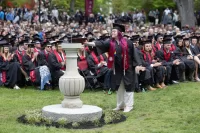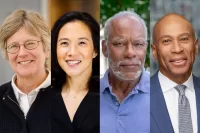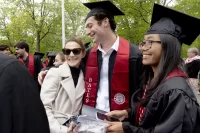
Like many of us, renowned biochemist Jennifer Doudna is watching with concern “an increasing distrust of science and scientists, facts becoming intertwined with alternative facts, [and] public support of scientific research — and the scientific method itself — being questioned.”
But Doudna may have surprised some of the several thousand people attending Bates’ 153rd Commencement when she said, “I feel that at least some of the responsibility for this state of affairs lies with those of us who are scientists.”
The featured speaker at the May 26 ceremony, which sent 469 newly minted Bates alumni into the world, Doudna was a key participant in the discovery of the CRISPR-Cas9 technology, a radically accessible approach to editing the DNA of any organism. She is also a leading voice in the discussion of the ethical use of this technology.
View the 2019 Bates Commencement.
Doudna was one of three notables to receive an honorary degree at the 2019 Commencement, the others being:
- Megan Smith, CEO of shift7 and former U.S. chief technology officer who is a visionary for tech innovation, collaboration, education, and inclusivity;
- and Travis Mills, a Maine resident and Army veteran who became a quadruple amputee in combat and is now an advocate for combat-injured veterans. Mills received a standing ovation upon receiving his degree.
The three honorands joined college President Clayton Spencer, senior speaker Claire Naughton ’19, and others on the Coram Library Terrace for the event, for which early rain resolved into an unbeatably beautiful late-spring day. An estimated 5,000-plus family members, faculty, staff, and friends attended.
If the theme of Doudna’s address was overcoming challenges, her observation about the erosion of public faith in science was, itself, a sort of challenge. Whatever else you do in life, she told the Bates graduates, she implored them to work “to advance public appreciation and understanding of thoughtful engagement.”
For too long, she explained, scientists have failed to broadly communicate the substance and implications of their work. Whatever career you choose, she told the graduates, involve yourselves in the broad public discourse about the “topics you care deeply about.”
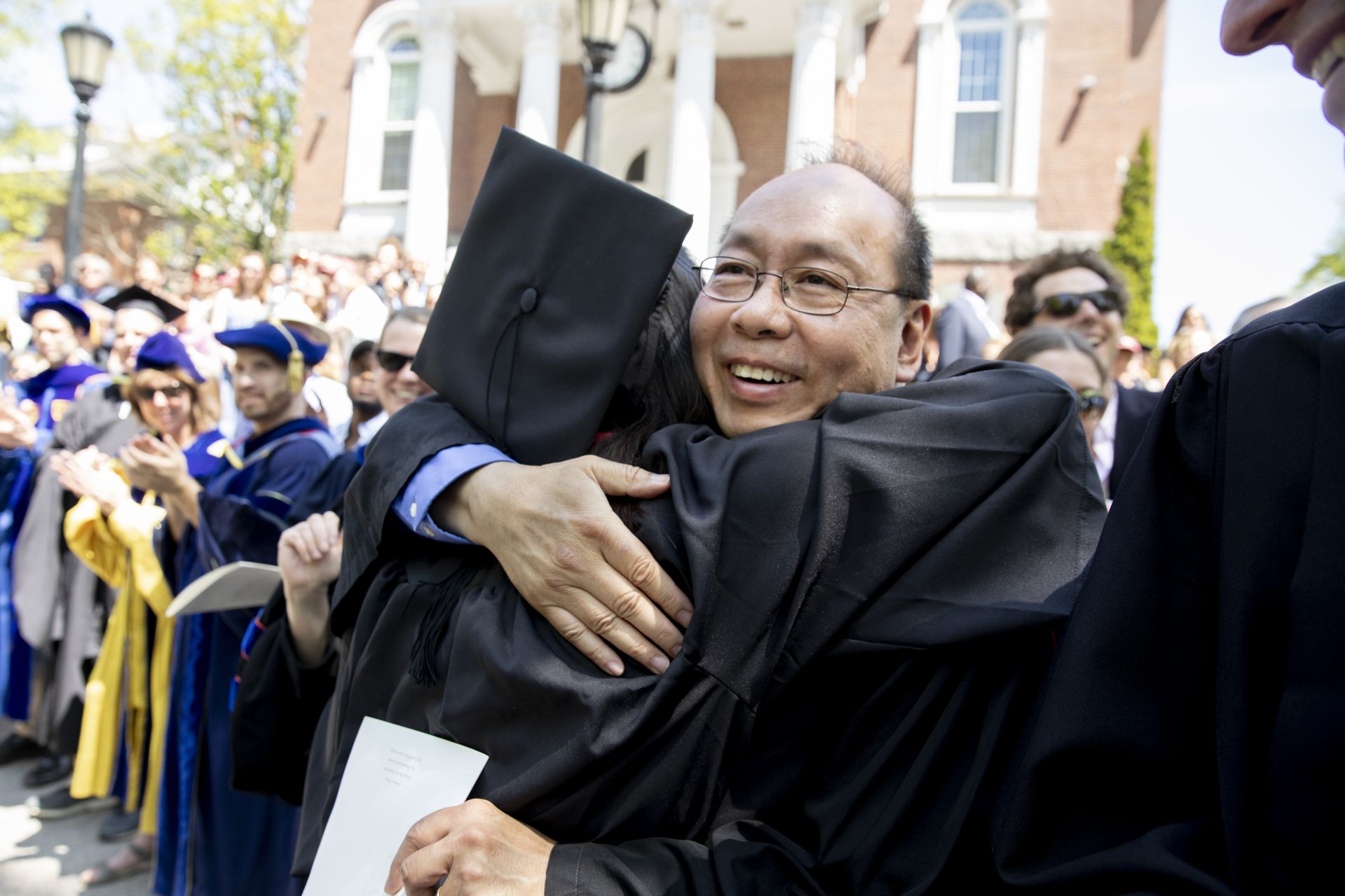
Math professor Peter Wong hugs a new graduate during the recessional. (Phyllis Graber Jensen/Bates College)
“We must rebuild public trust in our work, and we must explain to our fellow citizens why our work matters, not just to publish the next academic article or to make the next advance in our field, but truly to advance human knowledge and to improve the human condition.”
Doudna offered herself as an example. While she came late to it, she reminded her audience that she has accompanied her accomplishments in genome editing with thoughtful and prominent discussion of the implications of that work — implications that, she has written, affect “nothing less than the future of our world.”
Prefaced by an anecdote about a case of performance anxiety that struck as she read a Robert Frost poem to her eighth-grade classmates, Doudna also offered a couple of attitudinal approaches to overcoming challenges.
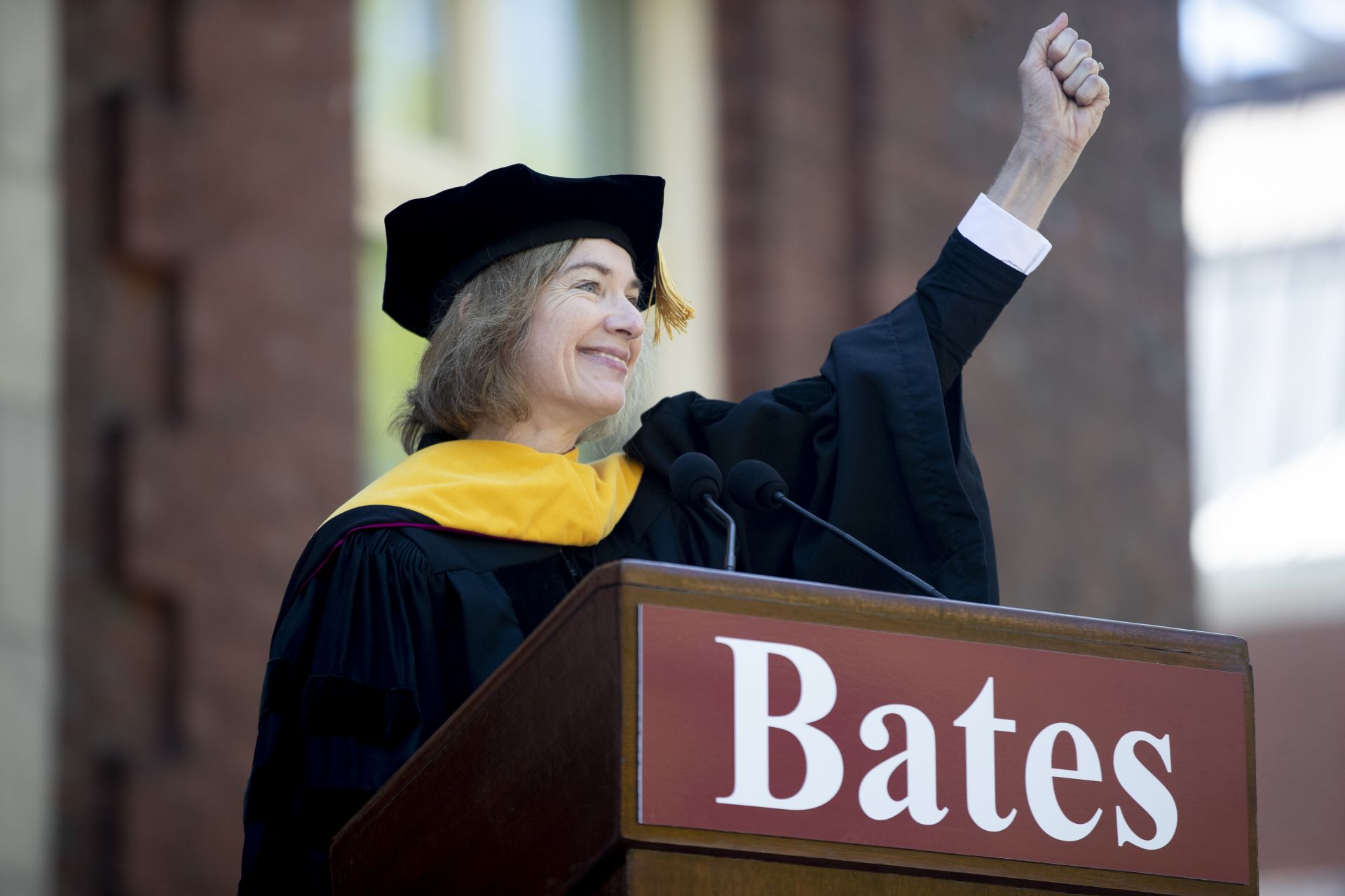
Commencement speaker and biochemist Jennifer Doudna salutes the 469 members of Bates’ Class of 2019. (Phyllis Graber Jensen/Bates College)
Take initiative, she advised. Doudna told the story of a student in her lab at the University of California, Berkeley, whose interest in science had been sparked by her work as a cosmetologist. “What really caught her fancy was the chemistry of nail polishes, and how different chemicals interact with hair and the structure of hair proteins,” Doudna said.
“I can’t tell you how thrilled I was when she graduated with a degree in chemistry from UC Berkeley, summa cum laude, and joined an M.D./Ph.D. program to become a pediatrician — an incredible story of perseverance.”
And learn to trust yourselves, she said, even in the face of your own and others’ doubts. When her grandfather questioned her choice to earn a doctorate in biological chemistry, she nevertheless knew “that was what I really wanted to do. I was doing work that I felt passionate about and, I guess, I hoped in my heart it would contribute some day to improving the human condition.”
Senior speaker Naughton, graduating with her twin sister, Daly Naughton, also explored the notion of conquering self-doubt. An environmental studies major from Darien, Conn., Naughton tapped a lesser-known aspect of the Greek myth of Icarus to urge her classmates to keep their sights high as they move into life’s next chapter.
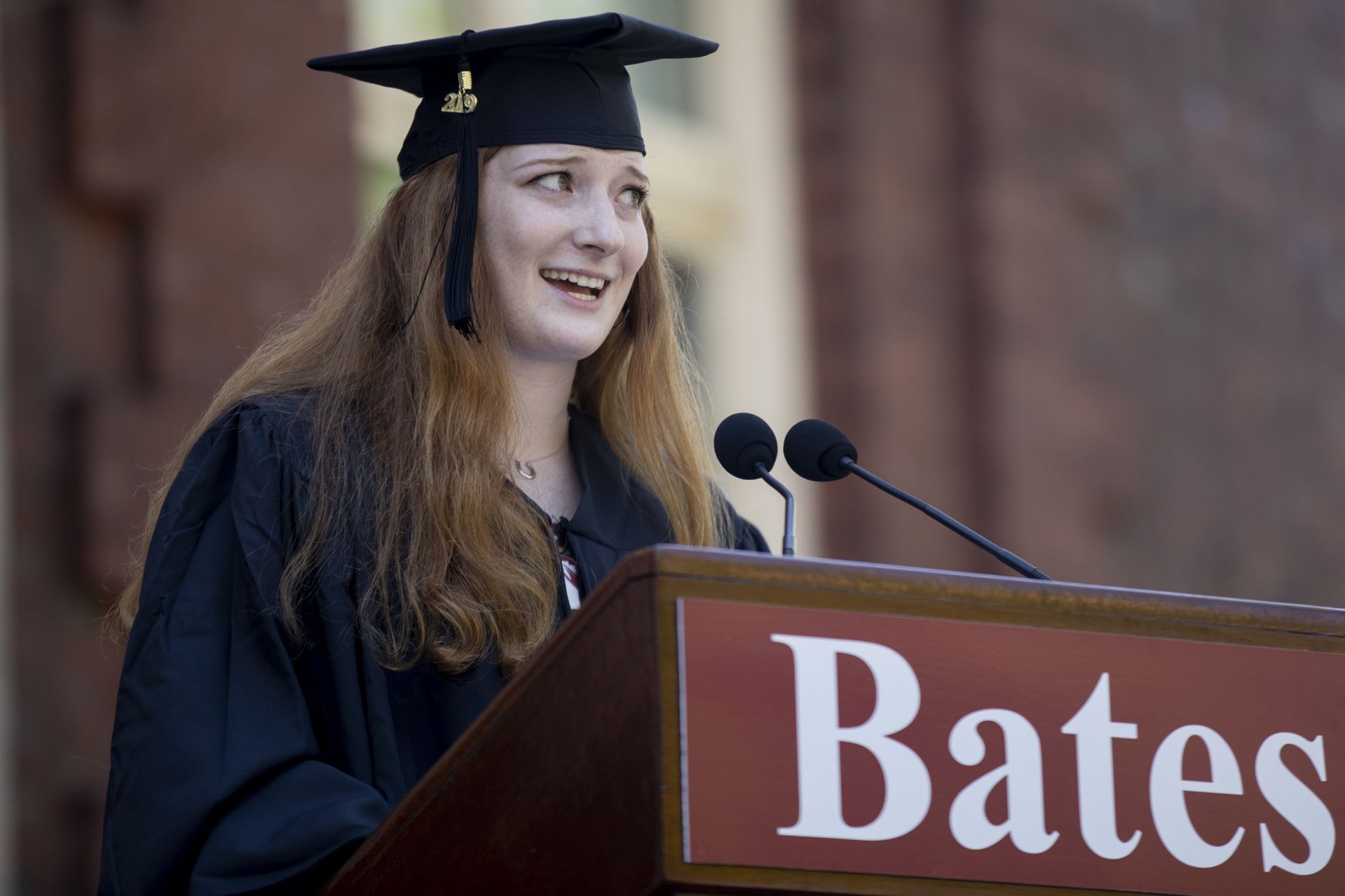
The senior speaker, Claire Naughton, used the story of Icarus to remind her classmates to set their sights high as they begin the next chapter of their lives. (Phyllis Graber Jensen/Bates College)
A fan of Greek mythology since elementary school, “I loved the lessons that Greek myths taught,” Naughton said.
Her favorite was the story of Icarus. With his father, Daedalus, Icarus escapes from the island of Crete and its monstrous inhabitant, the half-human, half-bull Minotaur, who is confined to a labyrinth there. The father and son leap from a tower on the island and fly away on wings that Daedalus fashioned from feathers and wax.
It’s well-known that Icarus dies during the flight when he defies his father’s advice and flies too close to the sun, whose heat destroys his wings.
“The lesson is clear — hubris is a deadly thing,” Naughton said. “Have humility, avoid arrogance. Don’t aim too high. No one likes a cocky know-it-all and everyone loves to see someone get what they deserve.”
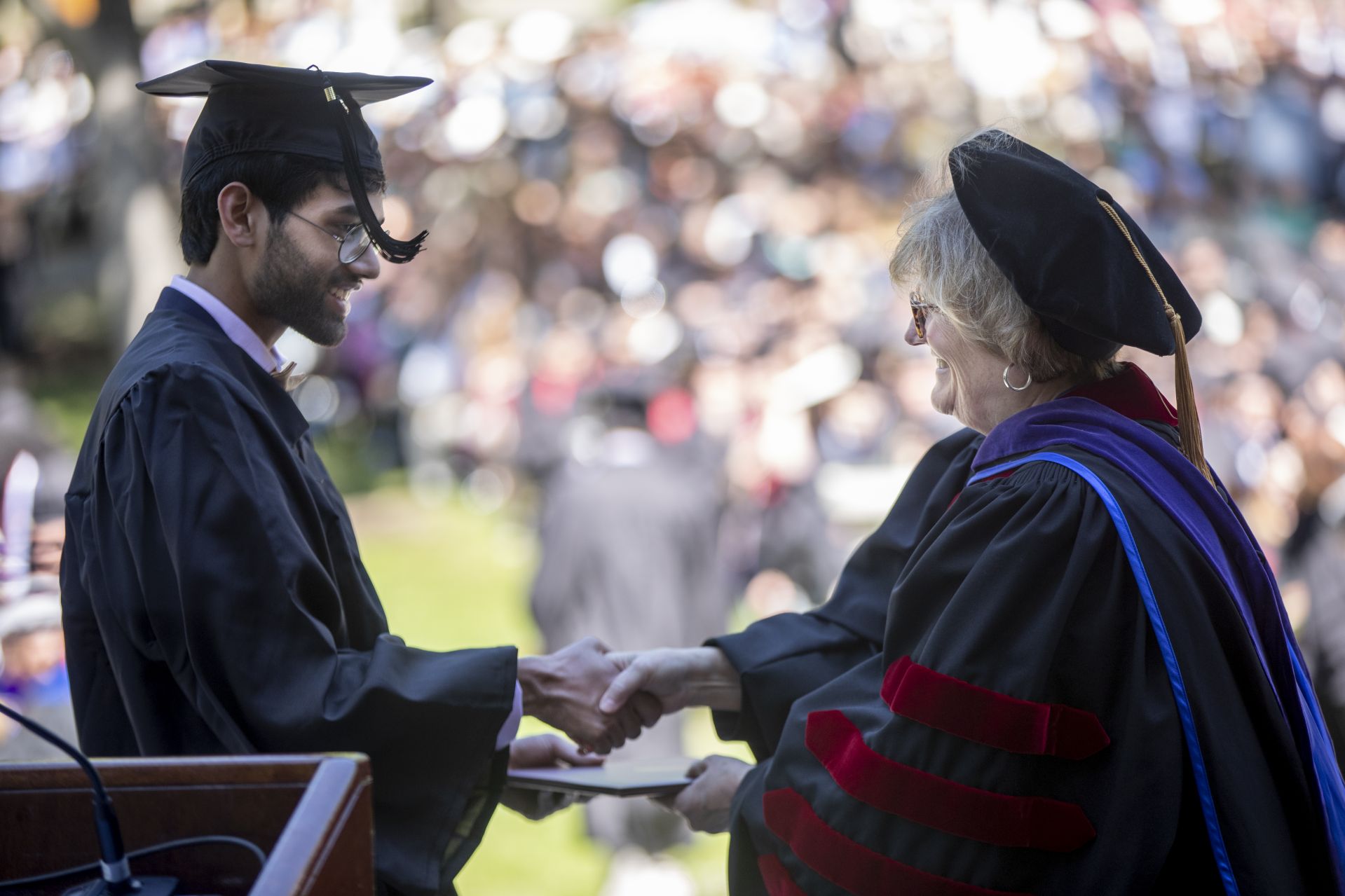
Rohan Bhat, a double major in philosophy and in classical and medieval studies, accepts his diploma from President Clayton Spencer. (Phyllis Graber Jensen/Bates College)
But in Naughton’s telling, Daedalus also warned his son “not to fly too low, because the ocean will drench his feathers and drag him down. There can be just as much danger in flying too low and keeping yourself down as there is in being too bold.”
She continued, “This past year, I found myself living my very own Icarus myth, complete with a Minotaur, a labyrinth, and that heart-stopping moment when you see the ocean rushing up to meet you. And I like to think that I’m not the only one who has experienced something like this. So today I want to explore our own Icarus myth.”
The Minotaur that she had to escape, Naughton said, “was my fear that no matter what I did, it wouldn’t be good enough, because somehow I wasn’t good enough. A crippling fear that told me it was better to do nothing than to do something that wasn’t perfect.”
The metaphorical feathers for her wings, Naughton said, have included the things she treasures about people she’s close to, such as Daly. The binding wax is “made of your grit, your passions, your dreams and goals” — and the fleeting pleasures of one’s time at Bates.
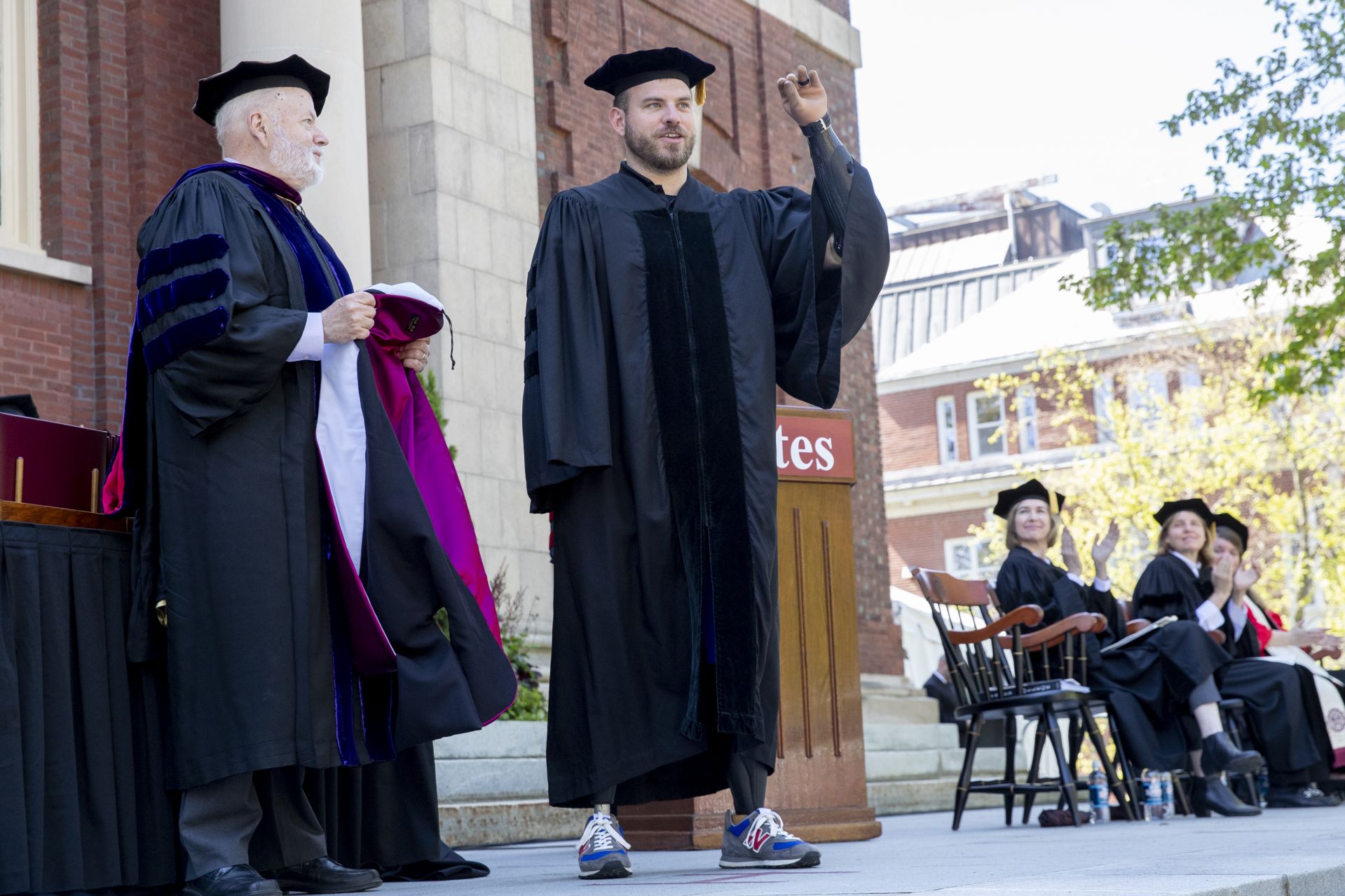
Travis Mills, a soldier injured in combat who is now an advocate for other veterans, receives an honorary Doctor of Humane Letters degree. Placing the collar on Mills is the college’s mace bearer, Phillips Professor of Economics Michael Murray. (Phyllis Graber Jensen/Bates College)
Getting away, only to fly too low and water-log their wings, Naughton said, is the risk that faces the Class of 2019. “The voice in your head is what drives you toward the ocean, and no one ever talks about that part of the Icarus myth,” she said.
“If you never push yourself, you can never fail,” she said. “But isn’t it a worse failure to never know what you really could have done?”
Bates, she concluded, is “the place that taught us to crave the freedom of flight. And now we’re standing on the edge of a tower overlooking an ocean. And just on the horizon line you can see everything you’ve ever wanted to be.
“It’s time to believe in yourself and your victories and failures. It’s time to feel the heat of the sun on your back. It’s time to jump.”
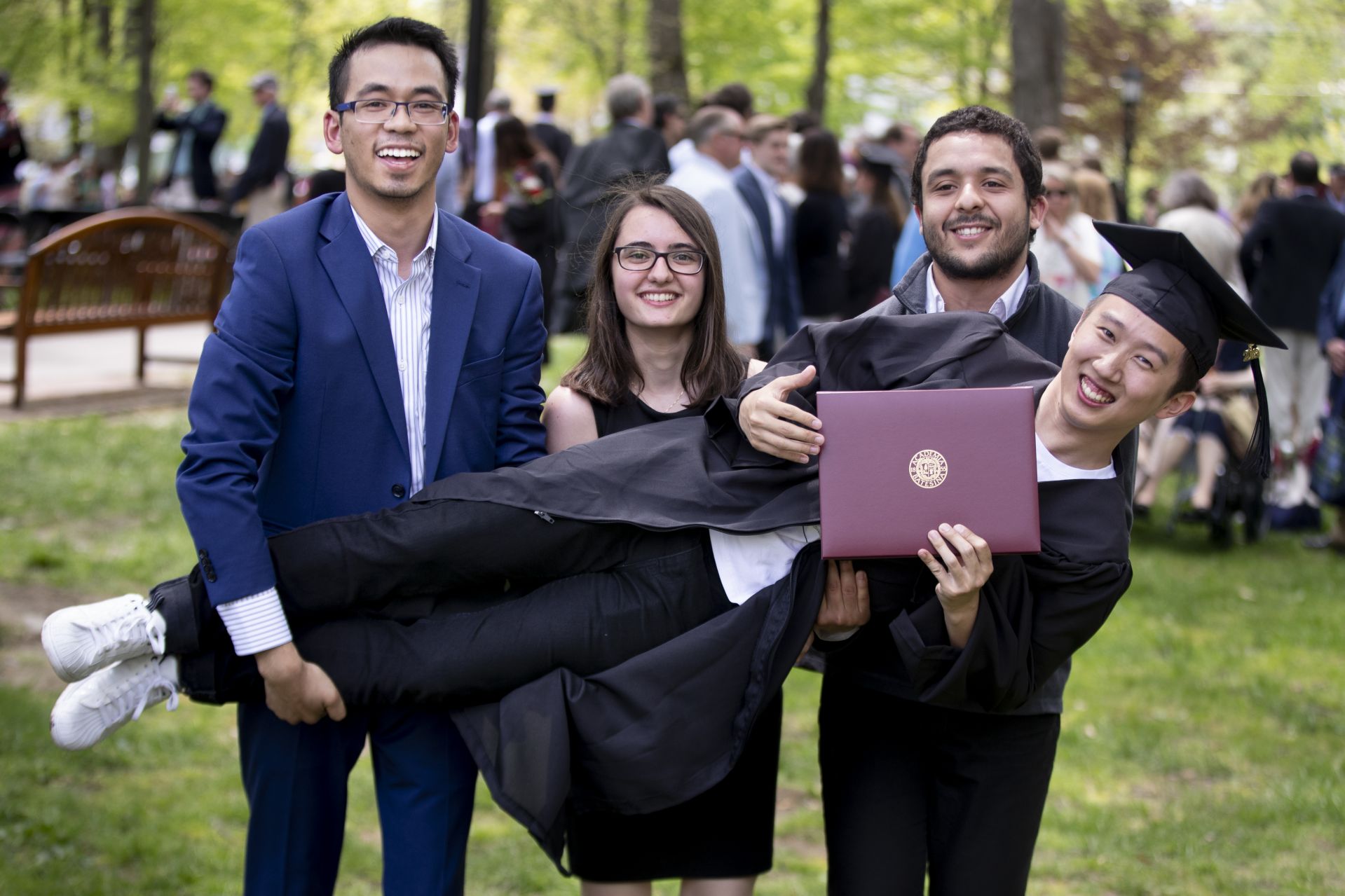
Max Huang ’19, who graduated summa cum laude as a triple major in math, economics and physics, is held up by (from left) Deepsing Syangtan, Maria-Anna Chrysovergi, and Salim Ourari, all ’18. (Phyllis Graber Jensen/Bates College)
In her welcome, Spencer painted a statistical portrait of the Class of 2019. The 469 graduates represent 36 states, 36 countries, the U.S. territories, and the District of Columbia, she noted, and 10 percent of the seniors were first-generation-to-college students.
Ninety-four students were double majors. One was a triple major: Tianyao Max Huang of Suzhou, China, who majored in economics, mathematics, and physics. Forty percent of the class played a varsity sport. Twenty graduates were offered Fulbright fellowships.
Yet, the president, said, “what I am most proud of, beyond these impressive facts and figures, are the human qualities you embody — your adventurous spirits, your creativity, your generosity, your senses of humor, and your drive for justice. Most of all, I love your joy in, and caring for, one another.”
The Commencement Choir, led by Lecturer in Music John Corrie, ran with that theme as they gave a poignant a cappella performance of the Beatles’ “In My Life.”
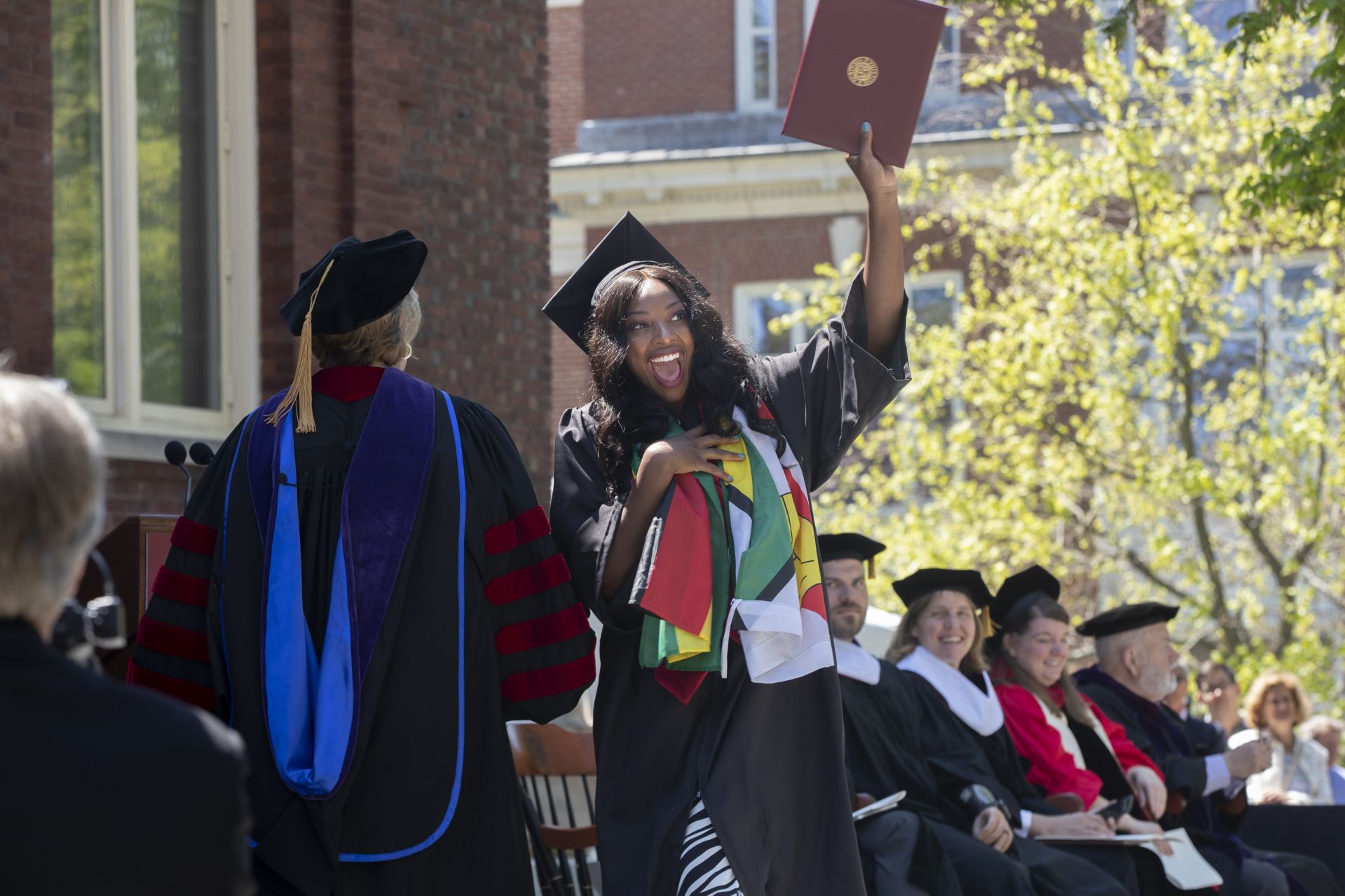
Kudzaiishe Irene Mapfunde, a psychology major, displays her diploma. (Phyllis Graber Jensen/Bates College)
After handing out 469 diplomas and directing the graduates to push their tassels from right to left, Spencer welcomed a few more folks to the Coram stage to conclude the ceremony. Alumni Association President Larry Handerhan ’05 welcomed the class to the association, encouraging the seniors “to stay engaged, stay curious, stay connected – and seek the joy in this place and the people and ideas it introduced you to.”
Senior Gift Co-Chairs Erika Lamere, Elizah Laurenceau, and Taylor Lough were pleased to announce a new participation record for a senior class, at 92.5 percent, representing 434 members of the class, who donated a total of $6,246.
In her benediction, Multifaith Chaplain Brittany Longsdorf expressed hopes that the great potential of the class will find full fruition. “May you be a stout, unlit candle,” she said, “where passion and purpose can ignite and burn without ceasing.”
Finally, as the Atlantic Clarion Steel Band launched a rocking number to get the recessional into gear, mace bearer and economics professor Michael Murray made it clear that it was perfectly OK to dance.
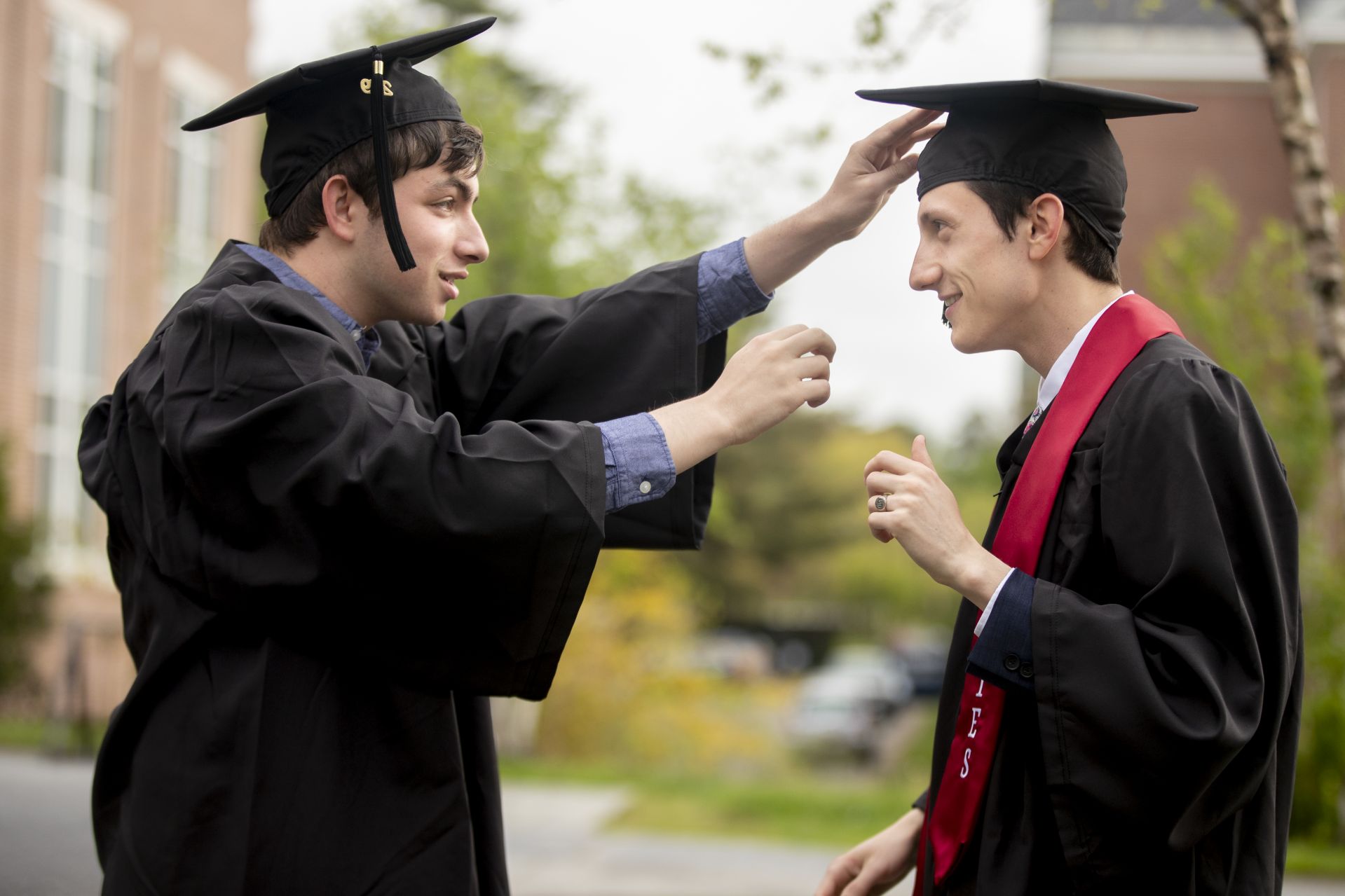
The first seniors on Alumni Walk on Commencement day, David Unterberger (left) and Nicholas Damianos check each other’s cap alignment. (Phyllis Graber Jensen/Bates College)
